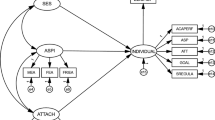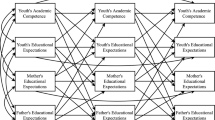Abstract
Youth from single-parent families report lower educational aspirations than those from two-parent families. This study explored the influence of background factors (gender, grade, parental education and SES), parental involvement with education, academic self-concept, and peer influences on educational aspirations. The participants were Canadian adolescents; 2751 from two parent and 681 from single-parent families. ANOVA results showed that adolescents from single-parent families scored significantly lower than adolescents from intact families on educational aspirations, and other predictor variables. Hierarchical regression analysis showed that the pattern of relationships between educational aspirations and other factors was very similar for adolescents from both types of families; namely academic self-concept significantly predicted educational aspirations. The family involvement and background factors predicted educational aspirations via academic self-concept. Having academically oriented peers was especially beneficial to adolescents from single-parent families. Implications for intervention programs are discussed.




Similar content being viewed by others
References
Amato PR (1994) Father-child relations, mother-child relations, and offspring psychological well-being in early adulthood. J Marriage Fam 56(4):1031–1042
Argys LM, Peters HE, Brookes-Gunn J, Smith JR (1998) The impact of child support on cognitive o outcomes of young children. Demography 35:159–73
Astone NM, McLanahan S (1991) Family structure, parental practices, and high school completion. Am Sociol Rev 56:309–320
Barnes GM, Farrell MP (1992) Parental support and control as predictors of adolescent drinking, delinquency, and related problem behaviors. J Marriage Fam 54:763–776
Baumrind D (1971) Current patterns of parental authority. Dev Psychol Monogr 4(Pt. 2):99–102
Bigelow B, Zhou R (2001) Relational scaffolding of school motivation: Developmental continuities in students’ and parents’ ratings of the importance of school goals. J Genet Psychol 162(1):75–92
Blishen BR, Carroll WK, Moore C (1987). The 1981 socioeconomic index for occupations in Canada. Can Rev Sociol Anthropol 24:465–488
Bowlby J, McMullen K (2002) At a crossroads: First results for the 18 to 20-year-old cohort of the youth in transition survey. HRDC Publications. Hull, Quebec, Can
Cancian M, Meyer DR (1998) Who gets custody. Demography 35:147–157
Conger RD, Ge X, Elder GH Jr, Lorenz RO, Simons RL (1994) Economic stress, coercive family process, and developmental problems of adolescents. Child Dev 65:541–561
Corak M (1999) Death and divorce: The long-term consequences of parental loss on adolescents. Family and Labour Studies. Statistics Canada
Dornbusch S, Ritter P, Leiderman P, Roberts D, Fraleigh M (1987) The relation of parenting style to adolescent school performance. Child Dev 58:1244–1257
Duran BJ, Weffer RE (1992) Immigrants’ applications, high school process, and academic outcomes. Am Educ Res J 29(1):163–181
Farmer HS (1985) Model of career achievement motivation for women and men. J Couns Psychol 32(3):363–390
Fuligni A, Eccles J (1993) Perceived parent-child relationships and early adolescents’ orientation toward peers. Dev Psychol 29:622–632
Funder K, Kinsella S (1991) Divorce, change and children: Effects of changing family structure and income on children. Fam Matters 30:20–23
Garg R, Kauppi C, Lewko J, Urajnik D (2002) A structural model of educational aspirations. J Career Dev 29(2):87–108
Goodnow C (1993) Classroom belonging among early adolescent studies: Relationship to motivation and achievement. J Early Adolesc 13:21–24
Grolnick W, Ryan R, Deci R (1997) Internalization within the family: The self-determination theory perspective. In: Grusec J, Kuczynski L (eds) Parenting and children's internalizations of values. Wiley, Toronto
Grolnick W, Slowiaczek M (1994) Parents’ involvement in children's schooling: A multidimensional conceptualization and motivational model. Child Dev 65:237–252
Hauser R, Sewell W (1986) Family effects in simple models of education, occupational status, and earnings: Findings from the Wisconsin and Kalamazoo studies. J Labor Econ 4:S83–S115
Hetherington EM (2002) For better or for worse: Divorce. Norton, New York
Hetherington EM, Bridges M, Isabella GM (1998) What matters? What does not? Five perspectives on the association between marital transitions and children's adjustment. Am Psychol 53:167–184
Hetherington EM, Cox M, Cox R (1982) Effects of divorce on parents and children. In: Lamb M (ed) Nontraditional families. Erlbaum, Hillsdale, NJ, pp 223–285
Hetherington EM, Stanley-Hagen M (2002) Parenting in divorced and remarried families. In: Bornstein M (ed) Handbook of parenting, Vol. 3: Being and becoming a parent, 2nd edn. Erlbaum, Mahwah, NJ, pp 287–315
Kaplan LS (1993) Coping with peer pressure, 1st edn. Rosen Publishing Group, New York
Lamborn S, Mounts N, Steinberg L, Dornbush S (1991) Patterns of competence and adjustment among adolescents from authoritative, authoritatian, indulgent, and neglectful homes. Child Dev 62:1049–1065
Mahoney JS, Merritt SR (1993) Educational hopes of Black and White high school seniors in Virginia. J Educ Res 87:31–38
Markus H (1977) Self-schemata and processing information about the self. J Pers Soc Psychol 35(2):63–78
Mau W-C, Bikos LH (2000) Educational and vocational aspirations of minority and female students: A longitudinal study. J Couns Dev 78:186–194
McLanahan S, Booth K (1989) Mother-only families: Problems, prospects, and politics. J Marriage Fam 51:557–580
Plucker JA (1998) The relationship between school climate conditions and student aspirations. J Educ Res 91(4):240–246
Plucker JA, Quaglia RJ (1998) The Student Aspirations Survey: Assessing student effort and goals. Educ Psychol Meas 58(2):252–257
Reynolds AJ, Walberg HJ (1991) A structural model of science achievement. J Educ Psychol 83:97–107
Rodriguez H, Arnold C (1998) Children and divorce: A snapshot. Center for Law and Social Policy, Inc
Rosenzweig CJ (2000) A meta-analysis of parenting and school success: The role of parents in promoting students’ academic performance. Dissertation Abstr Int Sec A: Humanit Soc Sci 61(4A):1636
Seginer R, Vermulst AD (2002) Family environment, educational aspirations, and academic achievement in two cultural settings. J Cross-Cultural Psychol 33(6):540–558
Statistics Canada (2005) Census families, number and average size. www40.statcan.ca/101/cst01/famil40.htm?sdi=parent
Steinberg L, Mounts N, Lamborn S, Dornbusch S (1991) Authoritative parenting and adolescent adjustment across various ecological niches. J Res Adolesc 1:19–36
Teachman JD, Paasch K (1998) The family and educational aspirations. J Marriage Fam 60:704–714
Trusty J (1998) Family influences on educational expectations of late adolescents. J Educ Res 91(5):260–270
University of Maine (1994) Student aspirations: A decade of inquiry, 1984–1994. Center for Research and Evaluation, College of Education, University of Maine, Orono
Wallerstein J (1991) The long-term effects of divorce on children: A review. J Am Acad Child Adolesc Psychiatry 3:349–360
Wallerstein J, Kelly J (1980) Surviving the breakup: How children and parents cope with divorce. Basic Books, New York
Wentzel KR (1998) Parents’ aspirations for children's educational attainments: Relations to parental beliefs and social address variables. Merrill-Palmer Q 44(1):20–37
West EM, Sweeting P, Richards M (2000) Teenage family life, life chances, life styles and health: A comparison of two contemporary cohorts. Int J Law, Policy, Fam 14(1):1–30
Zuckerman D (1981) Family background, sex role attitudes, and life goals of technical college and university students. Sex Roles 7:1109–1126
Author information
Authors and Affiliations
Additional information
The research was supported by a Social Sciences and Humanities Research Council of Canada Grant.
Rashmi Garg is an Associate professor in the Department of Psychology at Laurentian University. She received her PhD in 1983 from the University of Ottawa. Basically she is interested in applied research in the areas of educational and psychological measurement and testing. More specifically she is interested in the adolescent's education and career development.
Stella Melanson received a master's degree in Human Development from Laurentian University in 2003. She is working as a research data analysis coordinator for Ontario Early Years Education and Social Planning Council. Her interest is in early childhood education.
Elizabeth Levin is an Associate Professor and Chair of the Department of Psychology at Laurentian University. She received her PhD in 1986 from the University of Waterloo. Her major research interests focus on parenting styles and children's conceptions of parenting.
Rights and permissions
About this article
Cite this article
Garg, R., Melanson, S. & Levin, E. Educational Aspirations of Male and Female Adolescents from Single-Parent and Two Biological Parent Families: A Comparison of Influential Factors. J Youth Adolescence 36, 1010–1023 (2007). https://doi.org/10.1007/s10964-006-9137-3
Received:
Accepted:
Published:
Issue Date:
DOI: https://doi.org/10.1007/s10964-006-9137-3




